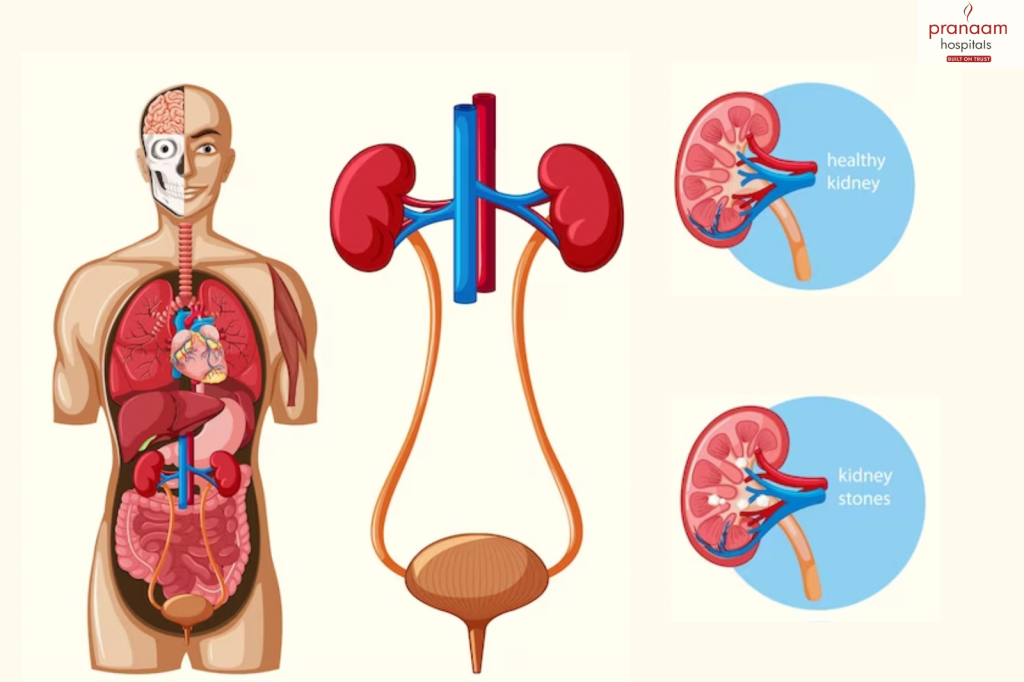Kidney stones develop when certain elements in the urine, such as phosphorus, calcium, and oxalate, reach excessive concentrations. Kidney stone development is a complex process influenced by many different factors.
Here are some common causes:
Dehydration: Insufficient fluid intake can lead to concentrated urine, increasing the risk of crystals sticking together and forming stones. Dehydration is a common contributing factor.
Genetics: A family history of kidney stones may increase an individual’s susceptibility. Genetic factors can influence the tendency to develop certain types of stones.
Dietary Factors:
High Oxalate Intake: Elevated oxalate consumption from foods like beets, chocolate, nuts, and specific vegetables can contribute to the development of oxalate stones. Dietary choices play a crucial role in kidney stone formation, and limiting intake of high-oxalate items is recommended to mitigate the risk of these particular types of stones.
High Animal Protein Intake: Diets rich in animal proteins may increase the excretion of calcium and other substances, promoting stone formation.
Medical Conditions:
Hypercalciuria: Excessive calcium excretion in the urine can lead to calcium oxalate stones.
Hyperoxaluria: High levels of oxalate in the urine may cause the formation of oxalate stones.
Cystinuria: a genetic problem that leads to an excessive excretion of cystine, which ultimately develops into cystine stones.
Urinary Tract Infections (UTIs): Infections can create an environment conducive to stone formation.
Metabolic Factors:
Obesity: Being overweight can alter the balance of substances in the urine, increasing the risk of stone formation.
Gastric Bypass Surgery: Some weight loss surgeries can affect the absorption of calcium and other substances, contributing to stone formation.
Medication: A variety of medications, such as diuretics, antacids with calcium in them, and antibiotics, can alter the content of urine and raise the possibility of stones forming.
Inactivity: Being immobile or lacking in physical activity might alter the way that bones metabolise calcium and raise the possibility of developing stones.
Geographical Location: The prevalence of kidney stones varies by geographical location, possibly due to differences in climate, diet, and water composition.
Gender and Age: The chance for stones in the kidneys appears to increase with age, with males usually more at risk than women.
Kidney Stones Diet and Nutrition Guidelines:
Maintaining a proper diet is crucial for individuals prone to or affected by kidney stones. Making strategic dietary choices can help prevent the formation of stones and manage their recurrence. Here are some guidelines and food recommendations for a kidney stones diet
Hydration is Key:
Adequate water intake is vital to dilute substances that can lead to stone formation.Try to consume 8 to 10 glasses of water or more if advised by a healthcare provider each day.
Limit Sodium Intake:
High sodium levels can contribute to the formation of certain types of kidney stones. Reduce salt intake by avoiding processed foods, fast food, and excessive use of table salt.
Moderation with Animal Proteins:
Exercise moderation with animal protein intake, restricting consumption of meats, eggs, and fish. These animal proteins can elevate the excretion of calcium and other substances, potentially contributing to the formation of kidney stones. Being mindful of the quantity of animal proteins in the diet is essential for minimizing the risk of stone development.
Select Plant-Based Proteins:
To lower your risk of kidney stones, choose plant-based protein sources such nuts, tofu, and legumes. These plant-derived protein options have been associated with a reduced probability of stone formation. Making choices that prioritize plant proteins can contribute to overall kidney health and help prevent the development of stones.
Calcium from Food Sources:
Include calcium-rich foods in your diet, but be cautious with calcium supplements. Adequate dietary calcium can bind to oxalates in the intestines, reducing their absorption and potential contribution to stone formation.
Foods to Avoid
Oxalate-Rich Foods: Some kidney stones are composed of oxalate crystals. Limit intake of high-oxalate foods such as beets, chocolate, tea, nuts, and certain vegetables like spinach and rhubarb.
Limit Oxalate and Calcium Combination: Avoid eating meals high in oxalate along with foods high in calcium to reduce the chance of calcium oxalate stones forming. Combining high-oxalate items with calcium-rich sources may elevate the likelihood of crystals forming within the kidneys. Being cautious about the simultaneous intake of these substances can help mitigate the risk of calcium oxalate stone development.
Reduce Caffeine and Soda Intake: Decrease caffeine and soda consumption to prevent dehydration, as it elevates mineral concentration in urine. Choose water or herbal teas as alternatives to maintain proper hydration and reduce the risk of mineral concentration-related issues in the urine.
Limit Sugar and High-Fructose Corn Syrup: Restrict the intake of sugar and high-fructose corn syrup, as their excessive consumption is linked to the formation of kidney stones. Opt for natural sweeteners in moderation and decrease the consumption of sugary beverages to mitigate the risk of stone development associated with high sugar and fructose levels.
Watch Phosphorus Intake: Manage phosphorus intake by restricting the consumption of phosphorus-rich foods like colas and processed foods. Excessive phosphorus intake is associated with an elevated risk of kidney stone formation.
Paying attention to dietary selections concerning phosphorus content can significantly contribute to averting the formation of kidney stones.
Also Read:The symptoms and causes of typhoid fever in children.


